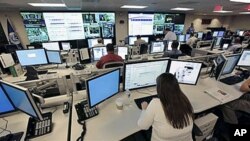A new OECD Cyber Security study by British professors says cyber weaponry will be used routinely in future wars. The study says computer attacks on their own will not necessarily constitute a threat, but a coordinated attack - or in combination with more computer attacks - could have serious consequences.
The Organization for Economic Cooperation and Development study is aimed at governments, corporations and policy makers to analyze the dangers posed by cyber attacks.
London School of Economics Visiting Professor Peter Sommer is one of the study authors. "There are actually relatively few, in fact very, very few cyber threats that are truly global in their impact," said Sommer. "On the other hand, there are a very large number of events, which could cause localized misery."
Co-author Ian Brown from the Oxford Internet Institute said it is largely governments that can make a big impact. "There is certainly potential for governments to use cyber attacks as part of ongoing warfare, but we said by and large it is unlikely, especially that terrorist groups, that hackers, that just criminal gangs would have that kind of impact."
Sommer said computers will play a part in future wars. "Most forms of war or the steps that are less than war, but might expand into it, are going to use cyber weapons as part of the portfolio of the range of other weapons that might be available as well."
The report says the most damage would be caused by a coordinated cyber attack or one alongside another incident, such as a national disaster.
The United States, NATO and Britain have made cyber-security priorities for their national defense. Sommer cautions they should not take a conventional defensive approach.
"A lot of the solutions to the problems are actually not military, it requires a great deal of cooperation between the government and the private sector," said Sommer.
The OECD report says a true cyberwar, fought only with computers, is unlikely.




